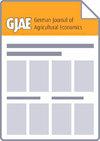EU Member States’ Voting for Authorizing Genetically Engineered Crops: a Regulatory Gridlock
IF 1.5
4区 经济学
Q4 AGRICULTURAL ECONOMICS & POLICY
引用次数: 45
Abstract
Several authors suggest a gridlock of the European Union's (EU's) approval process for genetically engineered (GE) crops. We analyse the voting behaviour of EU Member States (MSs) for voting results from 2003 to 2015 on the approval of GE crops to test for a gridlock; no reliable data are available pre-2003 - a time which included the EU's moratorium on GE crops. After the European Food Safety Authority (EFSA) has given a favourable opinion on the safety of a GE crop, the Standing Committee on the Food Chain and Animal Health (SCFCAH) votes on the application. If the SCFCAH reaches no decision, the Appeal Committee (AC) (pre the Treaty of Lisbon: the Council) votes on the application; if no decision is reached here, the final decision is left to the European Commission. All EU Member States (MSs) are represented on both committees; decisions are made by a qualified majority (QM) voting system, the rules of which have changed over time. Our data include 50 events; and 61 ballots at the SCFCAH and 57 ballots at the Council/AC. A QM has been achieved once only at the SCFCAH, but never at Council. At Council/AC level, Austria and Croatia have consistently voted against an approval, while The Netherlands has always supported approvals. All other MSs showed differences in their voting decisions at the SCFCAH and Council/AC level at least once. MS-fixed-effects are the major factors explaining the voting results supporting the gridlock hypothesis, while crop characteristics and crop use play no apparent role in MSs' voting behaviour. We maintain that a QM is unlikely following the latest directive for MSs to 'opt-out' on GE crop cultivation in their territories.欧盟成员国投票批准转基因作物:监管僵局
几位作者提出,欧盟(EU)对转基因作物的批准程序陷入了僵局。我们分析了2003年至2015年欧盟成员国(MSs)对转基因作物批准的投票结果的投票行为,以测试是否存在僵局;在2003年之前没有可靠的数据——这段时间包括欧盟暂停种植转基因作物。在欧洲食品安全局(EFSA)对转基因作物的安全性给出赞成意见后,食物链和动物健康常务委员会(SCFCAH)对该申请进行投票。如果SCFCAH没有作出决定,上诉委员会(AC)(在《里斯本条约》之前:理事会)对申请进行投票;如果这里没有达成决定,最终决定将留给欧盟委员会。所有欧盟成员国(MSs)都有代表参加这两个委员会;决策是由合格多数(QM)投票系统做出的,其规则随着时间的推移而改变。我们的数据包括50个事件;SCFCAH有61票,理事会/谘询委员会有57票。质量管理只在SCFCAH实现过一次,但从未在理事会实现过。在理事会/AC层面,奥地利和克罗地亚一直投票反对批准,而荷兰一直支持批准。所有其他ms在SCFCAH和Council/AC级别的投票决定中至少有一次表现出差异。小麦固定效应是解释支持僵局假说的投票结果的主要因素,而作物特征和作物使用对小麦的投票行为没有明显影响。我们认为,根据最新的指示,不太可能出现QM,要求MSs在其领土上“选择退出”转基因作物种植。
本文章由计算机程序翻译,如有差异,请以英文原文为准。
求助全文
约1分钟内获得全文
求助全文
来源期刊

German Journal of Agricultural Economics
AGRICULTURAL ECONOMICS & POLICY-
CiteScore
1.60
自引率
20.00%
发文量
0
期刊介绍:
The GJAE publishes a broad range of theoretical, applied and policy-related articles. It aims for a balanced coverage of economic issues within agricultural and food production, demand and trade, rural development, and sustainable and efficient resource use as well as specific German or European issues. The GJAE also welcomes review articles.
 求助内容:
求助内容: 应助结果提醒方式:
应助结果提醒方式:


